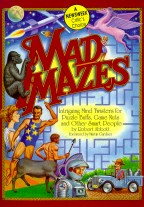So: At the first intersection, you can only go straight. At the second intersection you can again only go straight. At the third intersection you could go straight or turn north. Suppose you go north. At the next intersection you can only turn east. It’s true there’s a line that curves to the west, but there is no arrowhead pointing west.
Click here if you need a hint.
ForewordThis is the book’s Foreword, written by Martin Gardner.Inventing a new kind of puzzle, not too hard, not too easy, and fun to crack, is a much harder task than solving such puzzles. Robert Abbott is one of those rare individuals who has the knack of creating such puzzles. How he does it is a mystery. I first met Bob when I was writing the Mathematical Games column in Scientific American. He had invented a card game called Eleusis that had the remarkable property of simulating induction, the process by which scientific laws are discovered and theories formulated. My two columns on Eleusis were among the most popular. They led to other induction games, and even to some interesting research on induction. In 1963 Bob wrote Abbott’s New Card Games (alas, now out of print) that included Eleusis among other unusual games. No one has been as creative as Bob in devising bizarre mazes that are unlike any you have seen before. These mazes, let me add, also have an affinity with scientific method. What is science if not the trying of every possible path that can lead to the solution of a puzzle posed by Nature? When researchers reach a blind alley, they sigh and turn back to try other paths.
Bob’s mazes will not advance science or mathematics, but in working on them you will experience a pleasure that in its small way is similar to the pleasure experienced by scientists when they solve a problem. Think of the maze as a model of a tiny portion of a perhaps infinite universe— ReviewsNewsweek December 10, 1990.When all the presents are opened and you’re stuffed with plum pudding, settle down with Mad Mazes by Robert Abbott (Bob Adams, Inc. $14.95), a book of 20 mind- Mad Mazes by Robert Abbott, published by Bob Adams, Inc., 1990, $14.95, hardback, (also paperback, $7.95, published 1992) Reviewed by Michael Keller.
Bob Abbott, inventor of such games as Eleusis, Epaminondas, Ultima, and Construction, has created a fascinating collection of 20 mazes— Mad Mazes - Intriguing Mind Twisters for Puzzle Buffs, Game Nuts and Other Smart People, by Robert Abbott.
The typically American title says it all, really! This is a large, glossy colour book crammed with fiendish puzzle mazes. The book can be opened out to reveal the compendium of maddening games to tax your brain. Arrows, numbers, shape sequences and codes lead you through each variously themed maze. Mind-
Customer Comments liyet@bigfoot.com from Ilsan, South Korea, January 31, 1999 Wonderfully intricate puzzles for the stubborn or brilliant By saying the word “maze” I’m probably conjuring the image of those flat angles of black lines. This is NOT what you’ll get if you buy this book. Mad Mazes is precisely that— |

